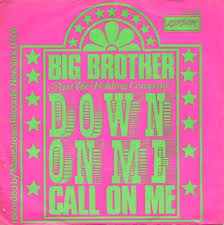| "Down on Me" | ||||
|---|---|---|---|---|
 | ||||
| Single by Janis Joplin with Big Brother and the Holding Company | ||||
| from the album Big Brother & the Holding Company | ||||
| B-side | "Call on Me" | |||
| Released | 1967 | |||
| Recorded | 1967 | |||
| Genre | Psychedelic rock | |||
| Length | 2:08 | |||
| Label | Mainstream | |||
| Songwriters | traditional, arr. Joplin | |||
| Producer | Bob Shad | |||
| Janis Joplin with Big Brother and the Holding Company singles chronology | ||||
| ||||
"Down on Me" is a traditional freedom song from the 1920s or earlier that became popular following its 1967 remake by Janis Joplin and Big Brother and the Holding Company. [1] [2] [3]